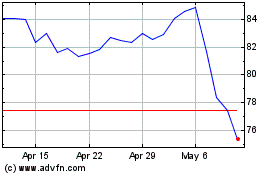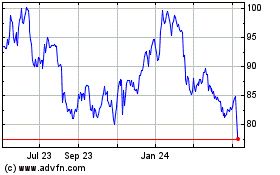TOKYO—An 83-year-old convenience-store pioneer who built a
Tokyo-based 7-Eleven empire said Thursday he would step down after
losing a boardroom clash that pitted him against U.S. hedge-fund
operator Daniel Loeb.
The resignation of Toshifumi Suzuki, chief executive of
7-Eleven's parent company Seven & i Holdings, was a milestone
for the budding activist-shareholder movement in Japan, which has
drawn strength from Prime Minister Shinzo Abe's
corporate-governance overhaul. Mr. Suzuki has effectively
controlled his company for decades and is one of Japan's most
prominent executives.
The battle between Mr. Suzuki and Mr. Loeb centered on
succession and corporate strategy. Under Mr. Suzuki, Seven & i
Holdings has aggressively acquired other retailers including
department stores and a baby-goods chain, while retaining the
money-losing chain of big-box stores called Ito-Yokado that
originally formed the company's core.
Mr. Loeb said the company should shed those businesses and focus
on convenience stores globally. And he praised the head of the
convenience-store business in Japan, Ryuichi Isaka, calling Mr.
Isaka a natural candidate to replace Mr. Suzuki as the parent's
CEO.
The dispute came to a climax on Thursday morning, when the Seven
& i Holdings board met to consider a proposal backed by Mr.
Suzuki to oust Mr. Isaka from his job. The vote was as close as it
could be: 7-6 in favor, with two abstentions. The motion failed
because it needed a majority of the 15-member board.
Hours later, at a sometimes-emotional news conference, Mr.
Suzuki said he was stepping down. He described a lengthy effort to
get Mr. Isaka to quit that ultimately failed. Mr. Suzuki said that
in light of the turmoil, he no longer felt worthy of continuing in
the CEO role.
No new CEO was immediately named. Mr. Suzuki said the board
would have to consider that as part of a broader management revamp.
A company spokeswoman said Mr. Isaka wasn't available to
comment.
In a call with reporters in March, Mr. Loeb said he would be
concerned if Mr. Suzuki's son, who serves as chief information
officer of Seven & i Holdings, received an edge in the choice
of a successor. "This is not a dynasty. This is a corporation," Mr.
Loeb said. He said in a March 27 letter to Seven & i Holdings'
directors: "Mr. Isaka should be rewarded—not demoted—for his
performance and commitment to delivering results for
shareholders."
The elder Mr. Suzuki denied that he wanted his son as a
successor. "I have never said it at the company and I have never
said it to my son either," he told the news conference.
Shares of Seven & i Holdings fell more than 8% at one point
Thursday but recovered to finish down 1.6% after news of the elder
Mr. Suzuki's planned resignation emerged.
In Japan, convenience stores are ubiquitous, selling a wide
variety of products such as rice balls and toiletries. They have
expanded into services, allowing customers to pay utility bills and
buy tickets to concerts. Mr. Suzuki helped develop the concept of
flooding urban areas with small stores, typically open 24 hours,
and carefully managing inventory of the 2,000 or 3,000 items people
are most likely to need.
The clash between Mr. Suzuki and Mr. Loeb reflects broader
changes in corporate governance roiling Japanese business.
A corporate-governance code pushed by the Abe government took
effect in June 2015, calling on companies to appoint outside
directors and pay more heed to shareholder concerns. One outside
director at Seven & i Holdings, Kunio Ito, led a government
panel that produced the 2014 "Ito Report" calling for a stronger
focus on shareholder returns.
Akira Kiyota, chief executive of the company that runs the Tokyo
Stock Exchange, said in an interview that the Seven & i
Holdings board's vote was an example of outside directors' growing
influence, an idea the exchange has helped promote in Japan.
"Governance is working," he said.
Mr. Loeb has said that his fund, Third Point LLC, owns hundreds
of millions of dollars in common shares of Seven & i Holdings.
The investor has made a name for himself in recent years by
challenging Sony Corp. to restructure unprofitable units and urging
industrial-robot maker Fanuc Corp. to raise dividends—with some
success in both cases.
The company now called Seven & i Holdings was long centered
around the big-box Ito-Yokado stores, which founder Masatoshi Ito
built on a U.S. model selling groceries, clothes and household
items.
In 1991, the Japanese company acquired the U.S. operator of
7-Eleven stores. Today, the global 7-Eleven business is fully owned
by the Tokyo-based company and it has more than 58,000 convenience
stores in Japan, North America, China and elsewhere.
Seven & i Holdings released results Thursday for the year
ending in February 2016 that showed how the convenience-store
business has come to dominate its profits while the big-box stores
are struggling—a point stressed by Mr. Loeb. 7-Eleven Japan
reported operating income of slightly more than $2 billion, while
Ito-Yokado posted an operating loss.
Founder Mr. Ito, 91, remains honorary chairman of Seven & i
Holdings, although he is no longer on the board. In a twist, Mr.
Suzuki's camp said it sought the founder's approval for Thursday's
board motion, but Mr. Ito refused to give it for reasons that
weren't clear. A spokeswoman said he wasn't available to
comment.
Mr. Suzuki appeared saddened by the rebuff from his longtime
patron. "He had never disagreed with whatever I proposed," Mr.
Suzuki said.
Write to Megumi Fujikawa at megumi.fujikawa@wsj.com and Kosaku
Narioka at kosaku.narioka@wsj.com
(END) Dow Jones Newswires
April 07, 2016 08:25 ET (12:25 GMT)
Copyright (c) 2016 Dow Jones & Company, Inc.
Sony (NYSE:SONY)
Historical Stock Chart
From Mar 2024 to Apr 2024

Sony (NYSE:SONY)
Historical Stock Chart
From Apr 2023 to Apr 2024
